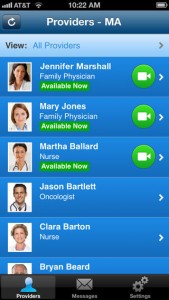 The US Department of Veterans Affairs announced that 690,000 US veterans received care in the 2014 fiscal year via telehealth, with 2 million telehealth visits scheduled. That means that 12 percent of all veterans enrolled in VA programs received telehealth care of some kind in 2014.
The US Department of Veterans Affairs announced that 690,000 US veterans received care in the 2014 fiscal year via telehealth, with 2 million telehealth visits scheduled. That means that 12 percent of all veterans enrolled in VA programs received telehealth care of some kind in 2014.
“We have to adapt to meet veterans wherever their needs are,” VA Secretary Robert A. McDonald said in a statement. “A brick-and-mortar facility is not the only option for health care. We are exploring how we can more efficiently and effectively deliver health care services to better serve our veterans and improve their lives. Telehealth is one of those areas we have identified for growth.”
The press release gave a few more statistics about the state and size of the VA's various telemedicine programs. For instance, 55 percent of VA telehealth visits were for veterans who lived in rural areas, with no VA medical facility nearby.
The VA currently offers more than 44 specialties via telemedicine, and one program -- in Miami -- schedules 90 telemedicine visits per week. The release also highlighted the VA's TeleAudiology program for veterans with hearing loss, which has grown from 1,016 veterans served in fiscal year 2011 to more than 10,589 in fiscal year 2014.
The VA has been working with telehealth, in the form of remote patient monitoring programs, since well before 2009. But virtual visits began in earnest in 2011 when the department partnered with American Well (now called AmWell) to launch online consultations at three locations. In 2012, they lobbied to eliminate co-pays for home telehealth visits, in the hopes of removing some remaining barriers to veterans using the service.
Of course, the VA has been a frontrunner in mobile technology for a long time. The Blue Button project, which connects patients directly with their own electronic medical records, originated as an in-house VA program. Just recently the department officially launched 10 health apps that were previously tested as part of a family caregiver pilot, to facilitate better home care of veterans by family and friends.
The VA also recently made some changes to its outside contracting procedures which now allow VA doctors to be reimbursed for certain clinical activity trackers in some cases.
















